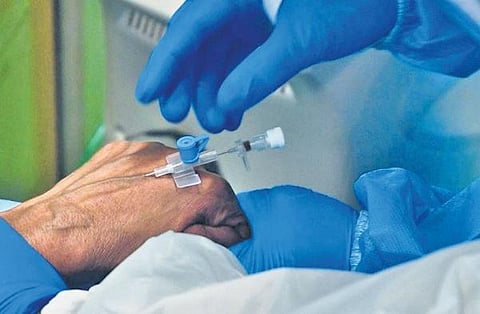Kerala running short of medication to meet black fungus threat?
KOCHI: High demand across the country for the drug required for the treatment of Mucormycosis or Black Fungal infection has caused supply chains to run dry, with hospitals in Kerala now finding its procurement difficult, even for emergency stock.
The shortage of Liposomal Amphotericin B, the anti-fungal drug used widely for the treatment of Black Fungus infections, has hit hospitals across the state. Private hospitals have been particularly affected. The state should continue to remain vigilant for the next two to three weeks, as cases are expected to rise, opine experts.
Around 40 cases of Mucormycosis, commonly known as Black Fungus infection, were reported in the state till last week. Six deaths have been recorded so far as well, due to the infection. “In Kerala, we cannot confidently arrive at a conclusion that the peak of Covid-19 second wave is over. Over the last two days, we have seen a reversal in numbers, and a downward trend is not settling down consistently. This can be due to various factors, such as the government having reduced the number of Covid tests being conducted, the reliance on antigen tests having increased, and so on. The lockdown restrictions that have been put in place have also played their role in bringing down the number of infections. However, we will be able to reach a conclusion only in a week or two,” said Rijo M John, health economist at Centre for Public Policy Research (CPPR).
Though the state government had promised to ensure the availability of medicines at all hospitals for the treatment of Black Fungus, due to high demand, especially in northern states, this has not not been met with. While earlier, private hospitals used to purchase the medicines from markets and manufacturers, due to the shortage, the Kerala Medical Services Corporation Ltd (KMSCL) has intervened.
Private hospitals requiring Liposomal Amphotericin B injection can approach KMSCL with the details of the patient and lab investigation report. “The main concern is that if there is not enough stock of the injection with us, we will not be able to give proper treatment to the patients. In the case of Mucormycosis, immediate intervention and surgery are required to control the spread of the infection. These will get delayed if the medicines do not reach in time. So far, Kerala is not suffering, but keeping in account the situation in Gujarat and Maharashtra, where the number of Black Fungus cases rose two to three weeks after the peak of the second wave of Covid got over, we should be extremely vigilant and prepared,” said a pulmonologist based in Kochi.
Though Liposomal Amphotericin B, intravenous injection, has been proven to be the most effective drug against Black Fungus infection compared to any other alternative drug, due to its shortage, doctors are searching for other alternatives.
“In the backdrop of increasing demand for Liposomal Amphotericin B for treatment of Mucormycosis, we need to explore and identify alternative options. The Fungal Infections Study Forum (FISF) has been active regarding this. Also, we have published guidelines on the options available. Posaconazole tablets/injections, Isavuconazole tablets/injections and even Itraconazole as a last resort, have been suggested. The reasonable approach would be to ensure adequate surgical clearance, followed by 1-2 weeks of Liposomal Amphotericin B, followed by a few weeks of Posaconazole or Isavuconazole,” said Dr Anup R Warrier, infectious disease expert.
Mucormycosis
- Liposomal Amphotericin B is the anti-fungal drug used widely for the treatment of black fungus infections
- Around 40 cases of Mucormycosis, commonly known as black fungus infection, were reported in the state till last week.
- Six deaths have been recorded so far as well, due to the infection

